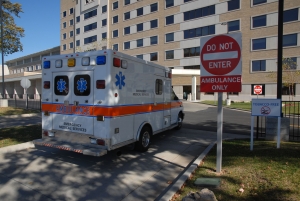 In the case of Jose v. Goodwill Industries and Gallagher Bassett, decided January 23, 2014, the First District Court of Appeals in Florida held that a Goodwill worker who passed out and fell at work was not able to pursue a workers’ compensation case because the claimant failed to produce objective medical findings substantiating an injury resulting from his fall at work. However, the Appellate Court noted that none of the doctors had been asked about the hospital CT scan taken on the date of the claimant’s accident, which revealed a hematoma or some hemorrhage. Neither of the doctors had been asked whether that condition substantiated an objective medical finding substantiating an injury at work.
In the case of Jose v. Goodwill Industries and Gallagher Bassett, decided January 23, 2014, the First District Court of Appeals in Florida held that a Goodwill worker who passed out and fell at work was not able to pursue a workers’ compensation case because the claimant failed to produce objective medical findings substantiating an injury resulting from his fall at work. However, the Appellate Court noted that none of the doctors had been asked about the hospital CT scan taken on the date of the claimant’s accident, which revealed a hematoma or some hemorrhage. Neither of the doctors had been asked whether that condition substantiated an objective medical finding substantiating an injury at work.
Pain may serve as the basis of an emergency medical condition if, in the absence of immediate medical attention, the claimant could reasonably be expected to suffer “serious dysfunction of any bodily organ or part.” In the case of Manuel Cespedes v. Yellow Transportation, the First District Court of Appeal decided on November 26, 2013, that in this case the claimant had a compensable injury on March 20, 2006 and was MMI’d by Dr. Chris Brown with a 6% impairment for an L5-S1 disk herniation. Thereafter, he treated intermittently with Dr. Brown. On March 19, 2011, he was admitted to Kendall Regional Medical Center under the care of Dr. Acebal, Claimant was found to have a massive herniated disk at L5-S1, severely compressing the nerve roots and Dr. Acebal did immediate surgery at L5-S1. Prior to surgery Dr. Acebal offered to transfer the Claimant’s surgery to Dr. Brown because he needed immediate surgery. Dr. Brown told Dr. Acebal to do the surgery. On March 22 Dr. Acebal performed surgery and the Employer/Carrier denied any further medical care. The Claimant tended to offer into evidence the opinion of Dr. Acebal, but the Employer/Carrier objected. The JCC erroneously sustained that objection. This case was eventually reversed with the Employer/Carrier being ordered to pay for the surgery.
Emergency care and services are defined under Fla. Stat. §440.13(1)(f). It refers to Section 395.002, Florida Statutes, as follows:
(9) “Emergency services and care” means medical screening, examination, and evaluation by a physician, or, to the extent permitted by applicable law, by other appropriate personnel under the supervision of a physician, to determine if an emergency medical condition exists and, if it does, the care, treatment, or surgery by a physician necessary to relieve or eliminate the emergency medical condition, within the service capability of the facility.
Thus emergency medical services and care begin when a physician undertakes a medical screening to determine whether there is a medical condition that is emergent. The questions to be asked the emergency doctor are as follows:
- Whether the service provider is a licensed physician (or other appropriate personnel acting under the supervision of a physician);
- Whether an evaluation screening or examination was conducted by that physician; and
- Whether such care was undertaken by the physician with the intent of determining “if an emergency medical condition exists.”
If each of these questions is answered yes, then under Section 395.002 and under Section 440.13(1), emergency services and care of some sort have been provided. This simply means that the provider can testify. Whether the emergency care is compensable under the workers’ compensation law. The compensability of the emergency care is determined by two elements:
- Is the care medically necessary under Section 440.13(2)? An employer has an obligation to provide such medically necessary remedial treatment, care and attendance for such period as the nature of the injury or the process of recovery may require.
- Under 440.13(3)(b), the emergency care is compensable if the injury requiring emergency care arose as a result of the workplace accident.
 Thus, to be compensable, such care must be not only emergency care but also medically necessary and it must be provided for a compensable injury. Furthermore, Fla. Stat. §440.13(5)(e) permits the admission of medical opinion testimony from a physician who is first proven to have provided emergency care and services per Fla. Stat. §440.13(5)(e) emergency providers do not need to receive express authorization from the carrier to be eligible for payment for treatment. By legislative decree, all licensed physicians and healthcare providers in this state shall be required to make their services available for emergency treatment of any employee eligible for workers’ compensation benefits with or without authorization from a carrier per Fla. Stat. §440.13(3)(b). To refuse to make such treatment available is cause for revocation of a license. An emergency medical condition is defined in Section 395.002(9)(a) as:
Thus, to be compensable, such care must be not only emergency care but also medically necessary and it must be provided for a compensable injury. Furthermore, Fla. Stat. §440.13(5)(e) permits the admission of medical opinion testimony from a physician who is first proven to have provided emergency care and services per Fla. Stat. §440.13(5)(e) emergency providers do not need to receive express authorization from the carrier to be eligible for payment for treatment. By legislative decree, all licensed physicians and healthcare providers in this state shall be required to make their services available for emergency treatment of any employee eligible for workers’ compensation benefits with or without authorization from a carrier per Fla. Stat. §440.13(3)(b). To refuse to make such treatment available is cause for revocation of a license. An emergency medical condition is defined in Section 395.002(9)(a) as:
(a) a medical condition manifesting itself by acute symptoms of sufficient severity, which may include severe pain such that the absence of immediate medical attention could reasonably be expected to result in any of the following:
1. Serious jeopardy to patient health…
2. Serious impairment to bodily functions
3. Serious dysfunction of any bodily organ or part.
Therefore, the testimony of Dr. Acebal should have been admissible as the surgery was covered under the workers’ compensation law.
In a footnote, the Court reminds us that the issue of whether emergency services and care have been provided can, under appropriate circumstances, be established by non-expert testimony per the case of University of Florida Board of Trustees v. Stone, 92 So.3d 264 (Fla. 1st DCA 2012).
 Florida Injury Attorneys Blog
Florida Injury Attorneys Blog


